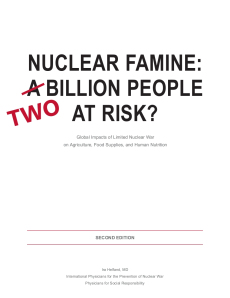 International Physicians for the Prevention of Nuclear War (IPPNW) and its US affiliate Physicians for Social Responsibility (PSR) today released a new report concluding that more than two billion people—a quarter of the world’s population—would be at risk of starvation in the event of a limited nuclear exchange, such as one that could occur between India and Pakistan, or by the use of even a small number of the nuclear weapons held by the US and Russia.
International Physicians for the Prevention of Nuclear War (IPPNW) and its US affiliate Physicians for Social Responsibility (PSR) today released a new report concluding that more than two billion people—a quarter of the world’s population—would be at risk of starvation in the event of a limited nuclear exchange, such as one that could occur between India and Pakistan, or by the use of even a small number of the nuclear weapons held by the US and Russia.
“A nuclear war using only a fraction of existing arsenals would produce massive casualties on a global scale—far more than we had previously believed,” said the report’s author, IPPNW co-president Ira Helfand.
Nuclear Famine: Two Billion People at Risk? updates a study originally written by Dr. Helfand in 2012. Like the previous edition, the report released today is based upon research published by climate scientists who have assessed the impact of nuclear explosions on the Earth’s atmosphere and other ecosystems.
The report comes as momentum builds internationally to reframe disarmament efforts around a renewed understanding of the humanitarian impact of nuclear weapons. In October, 125 nations issued a joint statement at the UN calling for the abolition of nuclear weapons as a humanitarian imperative. Next February, more than 100 nations will convene in Mexico to discuss the humanitarian consequences posed by nuclear war and the need to act on that knowledge.
“Countries around the world—those who are nuclear-armed and those who are not—must work together to eliminate the threat and consequences of nuclear war,” Dr. Helfand said. “In order to eliminate this threat, we must eliminate nuclear weapons.”
Former President of the Soviet Union Mikhail Gorbachev said in 2012 that the climate impacts of the use of nuclear weapons underscore that, “we must discard Cold War-style plans for the possible use of these weapons and move rapidly to eliminating them from the world’s arsenals.”
ICAN—the International Campaign to Abolish Nuclear Weapons—was launched by IPPNW in 2007 and now comprises more than 300 partner organizations in 80 countries campaigning for a treaty to ban nuclear weapons and to mandate their elimination. The report published today lends added weight to ICAN’s call to convene negotiations on such a treaty without further delay.
Courtesy: Peace and Health blog

